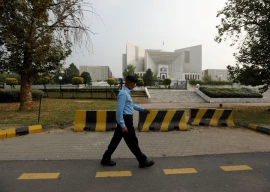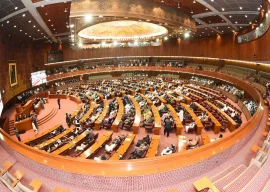
A writ petition was filed in the Lahore High Court on Wednesday challenging Section 4 of the Supreme Court (Practice and Procedure) Bill 2023, which provides the right to appeal decisions in suo motu cases. The petition requested the court to declare the bill ultra vires of the Constitution of Pakistan.
The joint sitting of parliament passed the bill with amendments days after President Dr Arif Alvi returned the bill seeking to curtail the Chief Justice of Pakistan’s (CJP) powers to initiate suo motu and constitute benches amid protest by the Pakistan Tehreek-e-Insaf (PTI) senators.
In the petition submitted before the high court, the petitioner prayed that the court suspends the operation of the aforementioned “impugned section” till the disposal of the plea petition.
It prayed that the court ask the position of the Ministry of Parliamentary Affairs Cabinet Division as to why the Constitution was breached.
Petitioner Mushkoor Hussain filed the petition through Advocate Nadeem Sarwar and listed the Federation of Pakistan through the Ministry of Law and Justice, Islamabad, Federation of Pakistan through the Ministry of Parliamentary Affairs Cabinet division, and the President of Pakistan through his principal secretary as the respondents in the case.
The plea argued that the bill was passed by both houses of parliament, sent to the president for approval, but returned by him for review. It continued that soon after the joint sitting of the parliament passed the bill.
“Article 184 of the Constitution deals with the original Jurisdiction of the Supreme Court of Pakistan,” the petition said, adding that under Article 184(3) the top court enjoyed original jurisdiction in matters of public importance brought before it for the enforcement of fundamental rights.
It highlighted that the article did not provide a right to appeal against any order passed under Article 184, while Article 185 dealt with the appellate jurisdiction of the SC.
Read Bill curtailing CJP's powers challenged in SC
The petition stated that Section 4 of the bill was repugnant to Articles 184 and 185 of the Constitution as both articles provided that no appeal could be made against an order passed under Article 184. It added that the only method to provide the right to appeal an order passed under Article 184 was to incorporate that through an amendment in articles 184 and 185.
“That the Respondent can only provide the right to appeal through an Act of Parliament in matters arising out of constitutional jurisdiction. The Companies Act 2017 is a glaring example of this. Under Section 6(14) of the Companies Act, 2017, the remedy lies before the Hon’ble Supreme Court by way of a petition for leave to appeal”.
It contended that the respondents had no legislative competence to enlarge the original jurisdiction of the SC without amendments to the Constitution and listed the famous case from the US constitutional history reported as Marbury v. Madison, as similar to the case at hand.
“Through the Judiciary Act of 1789, the Legislature of the United States of America bestowed upon the Supreme Court of America the power to issue the writ of Mandamus in its original jurisdiction, whereas, under Article III of the Constitution of USA the Supreme Court has following original jurisdiction:
“The Supreme Court shall have original jurisdiction in all cases affecting ambassadors, other public ministers and consuls, and those in which a state shall be a party. In all other cases, the Supreme Court shall have appellate jurisdiction.”
It continued that the US Supreme Court described the Act of 1789 as against the provisions of the Constitution and declared it unconstitutional and void.
“For the Constitution of the State is higher in authority than any law. In any case of conflict, the fundamental law must govern, and the act or provision of the Act in conflict with it must be treated as of no legal validity,” it cited the US SC verdict.
1731916090-0/sabrina-(3)1731916090-0-405x300.webp)


1732020599-0/BeFunky-collage-(73)1732020599-0-165x106.webp)
1731926127-0/zayn-(1)1731926127-0-165x106.webp)


1724319076-0/Untitled-design-(5)1724319076-0-270x192.webp)













COMMENTS
Comments are moderated and generally will be posted if they are on-topic and not abusive.
For more information, please see our Comments FAQ